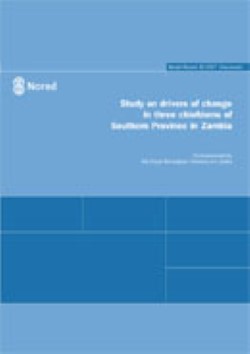Study on drivers of change in three chiefdoms of Southern Province in Zambia
Om publikasjonen
- Utgitt: august 2007
- Serie: Norads rapportserie
- Type: Norad-rapport
- Utført av: Lillian Prestegard and Eli Moen, Norad
- Bestilt av: The Royal Norwegian Embassy in Lusaka
- Land: Zambia
- Tema:
- Antall sider: 27
- Serienummer: 8/2007
- ISBN: 978-827548-224-0
- ISSN: --

This report is the result of the Norwegian Embassy in Lusakas support to a community development project in three chiefdoms of Southern Province in Zambia, targeting traditional leaders as local drivers of development.
The question posed is whether conventional approaches fail because they do not relate to the actors that hold power in the rural areas. The study looks at ways in which the Norwegian support could, over time, support local democratic and public administrative structures at the local level. In particular it looks at how traditional structures could be used to mobilise local communities to strengthen their participation in development, including the ability to articulate development needs and make claims towards relevant government institutions.
The analysis confirms the strong position of the traditional leaders in the communities. The traditional leaders tend to act as intermediaries between communities and local authorities - elected and administrative - which is justified by the strong notion of the community consensus, by which community decisions are made. Government, for their part, also tend to relate to the communities via the traditional leaders. NGOs working in the areas will go through the traditional leaders before approaching the communities, and some involve the traditional leaders in the implementation of their projects, much like government.
